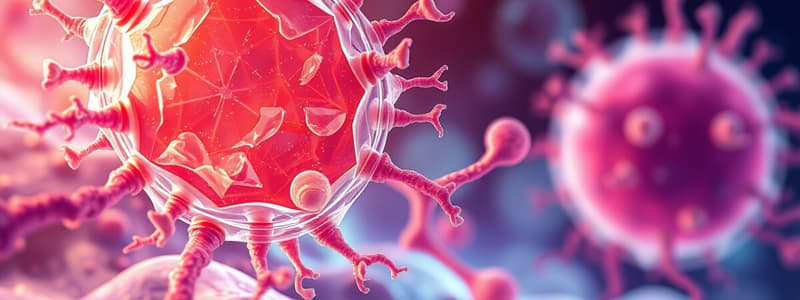Podcast
Questions and Answers
What is the structure of the Cell Wall?
What is the structure of the Cell Wall?
- Rigid layer surrounding the cell membrane (correct)
- Gel-like substance
- Network of microfilaments
- Thin layer of lipids
What is the main function of the Cell Membrane?
What is the main function of the Cell Membrane?
Regulates what enters and leaves the cell.
Cytosol is part of which larger structure?
Cytosol is part of which larger structure?
- Nucleus
- Rough Endoplasmic Reticulum
- Cytoplasm (correct)
- Golgi Apparatus
The function of the Cytoskeleton is to suspend organelles and maintain cell ______.
The function of the Cytoskeleton is to suspend organelles and maintain cell ______.
What is the role of Centrioles in the cell?
What is the role of Centrioles in the cell?
Proteins are the building blocks of all cells.
Proteins are the building blocks of all cells.
What does the Nucleus store?
What does the Nucleus store?
What is produced in the Nucleolus?
What is produced in the Nucleolus?
What is the primary function of Mitochondria?
What is the primary function of Mitochondria?
What are the two types of Ribosomes?
What are the two types of Ribosomes?
What is the function of the Rough Endoplasmic Reticulum?
What is the function of the Rough Endoplasmic Reticulum?
What does the Smooth Endoplasmic Reticulum synthesize?
What does the Smooth Endoplasmic Reticulum synthesize?
What is the Golgi apparatus primarily involved in?
What is the Golgi apparatus primarily involved in?
What is the main function of Lysosomes?
What is the main function of Lysosomes?
Vacuoles are used for ______ of food, water, and other materials.
Vacuoles are used for ______ of food, water, and other materials.
What process takes place in Chloroplasts?
What process takes place in Chloroplasts?
Flashcards are hidden until you start studying
Study Notes
Cell Structures and Functions
- Cell Wall: Rigid outer layer surrounding the cell membrane; supports and protects the cell.
- Cell Membrane: Semi-permeable lipid and protein layer; regulates substances entering and exiting the cell.
Cytoplasmic Components
- Cytosol: Jelly-like substance filling the cytoplasm; provides internal support and houses metabolites essential for cell metabolism.
- Cytoplasm: Region between the nuclear membrane and cell membrane, containing cytosol.
Cytoskeleton and Cell Division
- Cytoskeleton: Network of microfilaments and microtubules; maintains cell shape and organizes organelles while facilitating cellular movement.
- Centrioles: Cylindrical structures involved in aiding cell division.
Protein Structure and Function
- Proteins: Polymers of amino acids; serve as the building blocks for cellular structure and function, executing various cellular processes.
Nucleus and Ribosome Production
- Nucleus: Double-membrane-bound structure housing DNA and nucleolus; stores genetic information and regulates cell activities.
- Nucleolus: Dense region inside the nucleus; primary site for ribosome production.
Energy Production
- Mitochondria: Double membrane-bound organelles with folded inner membranes (cristae); responsible for cellular respiration and ATP generation from food energy.
Ribosome Functionality
- Ribosomes: Tiny RNA and protein spheres, either free in cytoplasm or bound to rough endoplasmic reticulum; crucial for protein synthesis, with free ribosomes producing proteins for internal use and bound ribosomes for secretion.
Endoplasmic Reticulum
- Rough Endoplasmic Reticulum (RER): Membrane network covered with ribosomes; functions in protein transportation and production through ribosomes.
- Smooth Endoplasmic Reticulum (SER): Membrane network without ribosomes; synthesizes lipids, detoxifies substances, and regulates calcium levels.
Protein Processing and Transport
- Golgi Apparatus: Stack of membranous sacs; modifies, packages, and secretes proteins synthesized by the ribosomes.
Waste Management and Storage
- Lysosome: Membrane-bound organelle filled with digestive enzymes; responsible for breaking down proteins, old organelles, food, and cellular debris.
- Vacuoles: Membrane-enclosed sacs; larger in plant cells, serving primarily for storage of food, water, and other materials.
Photosynthesis in Plant Cells
- Chloroplasts: Double membrane-bound organelles containing thylakoid membranes and their own DNA; sites of photosynthesis where light energy is converted into chemical energy in food.
Studying That Suits You
Use AI to generate personalized quizzes and flashcards to suit your learning preferences.



